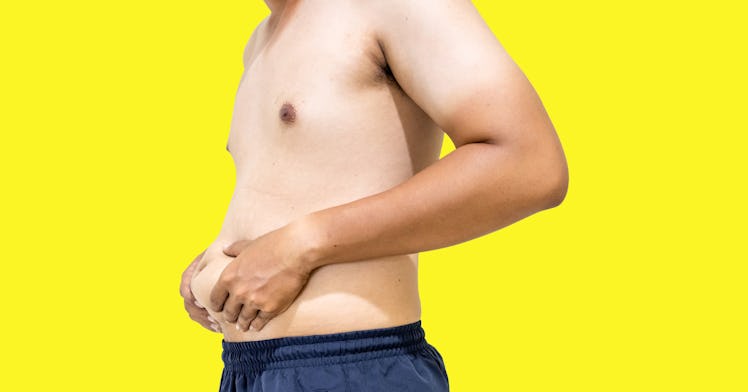The Evolution Of Dad Bod: Meaning & Origin
It's time to stop worrying about those extra pounds. Biologically-speaking, the dad bod helps you become a better father.

Dr. Richard Bribiescas, professor of anthropology at Yale University, doesn’t know how the term “dad bod” came to be. But he does know the science behind the biological changes a man’s body undergoes once he becomes a dad.
“The idea is simply that when you have more fat it changes testosterone levels in men,” Bribiescas, who penned How Men Age: What Evolution Reveals about Male Health and Mortality, says. “Testosterone is replaced with estrogen when men put on fat. It’s a hormone that promotes more caring behavior — and that’s where the whole idea that changes in body fat are a part of paternity come into play.”
The changes in body composition in men after testosterone levels plateau or decrease are in alignment with the changes that occur in general attitude towards having a family and “settling down.” In short, that means that having a dad bod allows you to be a better father, thanks to the shift in hormones that allow paternal instincts to take over. The idea negotiates the link between having a soft body because you’re a father and being a father because you have a soft body.
Sure, being crunched for time, eating on the go, and working out taking a backseat to family time after your kids come into the picture all contribute to that pudgier physique taking over. But a man’s biological responses to parenthood are what create a true dad bod. “I’m not talking about being obese or being overweight,” Bribiescas says. “Biologically, just a little bit of weight can make a difference in shifting emphasis from mating opportunities to staying put and paying attention to the family you have in front of you.”
According to research that appeared in the American Journal of Men’s Health, 1.7 kilograms of fat — which is less than three pounds — is enough fat to cause a hormonal change that shifts a man’s biological focus from being a strong, superior man in search of a mate into a caring, paternal family member. This shift could be your body’s defense mechanism to help you care for your family. “When there is a spike in testosterone it takes away health from other parts of your body,” Bribiescas explains. “When your testosterone spikes your immune system takes a hit, and you often do stupid things. That’s why we see a big spike in mortality in men between the ages of 15 and 25.”
It’s a suite of biological behaviors that are unique to the human species. According to Bribiescas, no other primates exhibit the level of paternal behavior that fathers do. “Not only do we exhibit these behaviors but there is a range of great dads or horrible dads,” he says. “Other primates don’t show any interest in paternity.”
These capabilities to be a father — not just a man who reproduces — could be an evolutionary consequence of a man’s lifespan. Humans can reproduce much later in life than other species. In many cultures, men have children in their fifties, sixties, and even in their seventies — and live far longer than their window of reproductive capabilities. “How are these men convincing women to have children with them?” Bribiescas says. “It’s not because they are strapping and storing. It’s because they can provide paternal care.” Psychologically, women see men with “dad bods” and are able to associate their softer figure with the ability to be a father and family member, not just a mate.
Granted, there’s still a vast amount of research to be done on this topic, and to discover just how much a man’s body composition correlates with becoming a father, but the connection is certainly there.
“These behaviors that are associated with paternal care and changes in body composition directly contribute to the biological evolution of fathers,” Bribiescas says. “We know that our hormones change with age, and they change when you become a father, but there is still so much more to discover about how it all affects the bigger picture of being a dad.”